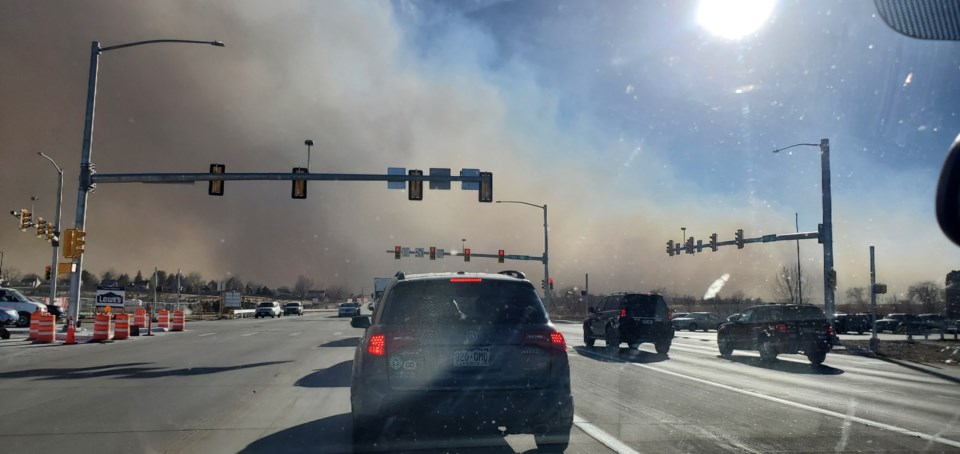A mother and daughter believed their rental home was uninhabitable after it was damaged in the Marshall fire.
However, the two could not break their lease before it was up in July unless they were willing to pay $4,000, according to a report released this week by the East County Housing Opportunity Coalition or ECHO. They couldn’t find comparable housing within a 10-mile radius that they could afford, and their property manager planned to increase rent by $1,000 once it was time to renew.
They told ECHO that the landlord was not helpful, and repair requests would be ignored or take months.
“I have never in my life worked with such incompetent people and lack of human decency,” the daughter told the coalition. “They blame the corporation for not doing necessary repairs.”
While much of the recovery from the Marshall fire has focused on home rebuilding, 340 renters were also displaced in the massive fire on Dec. 30, according to the Colorado Department of Local Affairs. ECHO undertook an initiative to discover what renters were experiencing in the aftermath, revealing the struggles many faced.
The nonprofit identified what it described as three major shortcomings in the law designed to protect renters following a disaster and called on legislators to make reforms to better protect rents after the next disaster in Colorado. The nonprofit spoke with renters at a community meeting, interviewed interested renters and conducted an online survey to get their perspectives following the Marshall fire.
Additionally, ECHO partnered with Stephen Hennessy, a civil litigator and trial lawyer in Boulder, who provided free legal services to Marshall fire survivors and completed a report on the legal remedies for Colorado disaster survivors as well.
One of the biggest issues that ECHO found related to habitability and remediation for tenants.
In Colorado, property owners must pay for suitable shelter for tenants while a unit is being made habitable after a disaster. However, landlords don’t have to tell tenants this or provide housing if the tenants don’t ask for it.
“Most tenants do not have attorneys, nor even a copy of their lease if the fire destroyed it,” ECHO said in a press release. “Thus, many tenants were paying for a hotel room out of their own pocket while property owners were remediating, as well as paying rent on their unit.”
ECHO recommended changing the law so that property owners are required to inform tenants of their right to a habitable unit following a disaster. There were also discrepancies with just what was considered habitable.
Many families reported illness after moving back into their rental units — headaches, dizziness and respiratory problems that weren’t necessarily addressed. ECHO recommended the state create an objective health-based standard for fire remediation.
Hennessy also spoke to habitability, pointing out that landlords have a right to terminate the lease if fire damage is so extensive that it cannot be remediated. If a landlord continues to lease the premises, Hennessy said they have a duty to ensure that property is habitable.
There are tenant remedies if a landlord breaches the habitability requirements, such as terminating the lease, deducting repair costs from their rent, civil action against the landlord or injunctive relief. However, there are strict procedural requirements that a tenant must satisfy before they can invoke those remedies, he said.
Along with that, ECHO noticed ambiguity in insurance coverage meant renters were often given the runaround trying to get someone to pay for the repairs. For example, Kana, who rented a place with another adult and two young children, had smoke and ash damage requiring work on the carpets, windows, ducts and insulation.
“Her renter’s insurance company would not move forward until the landlord/owner’s policy disclosed what they were doing,” the report said. “It was very difficult for her to navigate the insurance and right path to take since the fire. Kana says it has personally been very demoralizing.”
ECHO said that the statute should be clarified so insurance companies cannot take advantage of this ambiguity.
As renters navigated the remediation process for their homes, tenants who complained about smoke and ash damage were often told their lease would not be renewed, or if it was a month-to-month tenancy, they were given notice to terminate.
“This is not clearly spelled out in the statute as retaliation, and it should be,” the report said. “It is our belief that some landlords wanted to terminate the lease so they could take advantage of the increase in rents being charged after the fire.”
Many tenants had to move out of the area because prices increased so dramatically they could no longer stay in the area. ECHO pushed for an exception to the state’s rent control statute, which stops local governments from taking actions to keep rents stable, after major disasters.
A local firefighter said the Marshall fire made it unlikely she will be able to continue living in the area.
“My annual increase in rent is likely to be significantly more than past years, and has high
potential to drive me out,” she told ECHO. “Thus, the very people who support this community, even save the lives and property of community members, are forced to either move away or live in unhealthy and inhospitable conditions.”
Hennessy spoke to a new Colorado law that went into effect shortly before the Marshall fire that prohibited price gouging during a declared disaster period.
Following the fire, the Colorado Attorney General’s Office said it sent letters to companies expressing concern over reports that landlords were excessively raising the prices after survivors were displaced from the Marshall fire, but Hennessy said it was unclear if any legal action had been taken to further enforce that law.



